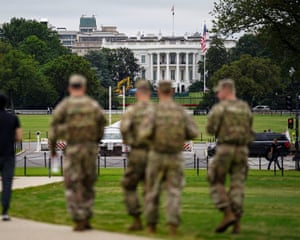
DOGE put Americans’ Social Security records at risk, whistleblower says
Entities mentioned:
- Department of Government Efficiency: Efficiency, Duty, Professional pride
- Social Security Administration: Security, Duty, Professional pride
- Charles Borges: Duty, Righteousness, Security
- Government Accountability Project: Justice, Transparency, Duty
- Office of Special Counsel: Justice, Duty, Security
- Trump administration: Power, Control, Influence
- Elon Musk: Ambition, Influence, Control
- DOGE team: Efficiency, Control, Influence
- Supreme Court: Justice, Duty, Control
- Nick Perrine: Professional pride, Security, Duty
Article Assessment:
Credibility Score: 75/100
Bias Rating: 45/100 (Center)
Sentiment Score: 25/100
Authoritarianism Risk: 35/100 (Generally Democratic)
Bias Analysis:
The article presents multiple perspectives, including the whistleblower, the agency, and concerned groups. It maintains a neutral tone while reporting on a controversial issue, balancing criticism with official responses.
Key metric: Data Security and Privacy
As a social scientist, I analyze that this article highlights a significant breach in data security practices within a major government agency, potentially affecting millions of Americans. The whistleblower's complaint suggests a systemic failure in protecting sensitive personal information, which could have far-reaching consequences for individual privacy and national security. The involvement of private sector entities (DOGE team) in accessing government data raises questions about the balance between modernization efforts and data protection. This situation reflects broader tensions between technological advancement, government efficiency, and the safeguarding of personal information in the digital age. The response from the Social Security Administration appears to downplay the severity of the issue, which may indicate a disconnect between internal perceptions of security and actual vulnerabilities. This incident could lead to decreased public trust in government institutions and their ability to protect citizens' data, potentially impacting social cohesion and civic engagement.

Marjorie Taylor Greene joins Bernie Sanders in urging US to end Gaza famine
Entities mentioned:
- Marjorie Taylor Greene: Ambition, Influence, Recognition
- Bernie Sanders: Righteousness, Justice, Moral outrage
- Donald Trump: Power, Control, Self-preservation
- California Governor: Competitive spirit, Determination, Professional pride
- Kilmar Ábrego García: Self-preservation, Security, Freedom
Article Assessment:
Credibility Score: 70/100
Bias Rating: 40/100 (Lean Left)
Sentiment Score: 30/100
Authoritarianism Risk: 45/100 (Mixed/Neutral)
Bias Analysis:
The headlines suggest a slight left-leaning bias, with more critical framing of Trump and conservative policies. However, diverse perspectives are represented, including conservative viewpoints, indicating an attempt at balanced coverage.
Key metric: Immigration and Integration
As a social scientist, I analyze that this collection of headlines reflects a complex political landscape surrounding immigration issues in the United States. The unexpected alignment of far-right Greene with progressive Sanders on Gaza indicates a potential shift in traditional party lines on international humanitarian issues. The Maine oysterman's Senate run suggests growing political engagement from non-traditional candidates, possibly due to dissatisfaction with current leadership. The California governor's confrontational stance against Trump highlights the intensifying political polarization. Trump's legal strategies and focus on immigration demonstrate his continued influence on Republican policy priorities. The decline in US immigrant population after 50 years of growth signifies a major demographic shift, likely influenced by stricter immigration policies and enforcement. This shift could have significant long-term impacts on the US economy, social fabric, and political landscape.

Fema staff warn Trump’s cuts risk exposing US to another Hurricane Katrina
Entities mentioned:
- FEMA staff: Professional pride, Duty, Security
- Donald Trump: Power, Control, Influence
- Hurricane Katrina victims: Self-preservation, Security, Fear
Article Assessment:
Credibility Score: 70/100
Bias Rating: 35/100 (Lean Left)
Sentiment Score: 25/100
Authoritarianism Risk: 30/100 (Generally Democratic)
Bias Analysis:
The article leans left, evidenced by its critical tone towards Trump's policies and the emphasis on potential negative outcomes. However, it does present factual information from FEMA staff, lending some balance to the reporting.
Key metric: Disaster Preparedness and Response Effectiveness
As a social scientist, I analyze that the article highlights a significant concern regarding the Trump administration's proposed budget cuts to FEMA and their potential impact on disaster preparedness. The reference to Hurricane Katrina serves as a stark reminder of the consequences of inadequate disaster response. This situation may lead to decreased capacity for emergency management, potentially leaving vulnerable populations at higher risk during natural disasters. The warnings from FEMA staff underscore a conflict between fiscal policy goals and public safety needs, reflecting broader tensions in governance and resource allocation.

Trump battles John Bolton, Chris Christie and threatens to pull funds from Wes Moore’s Maryland
Entities mentioned:
- Donald Trump: Revenge, Power, Self-preservation
- John Bolton: Self-preservation, Professional pride, Influence
- Chris Christie: Ambition, Revenge, Recognition
- Wes Moore: Duty, Pride, Justice
- Letitia James: Justice, Ambition, Righteousness
Article Assessment:
Credibility Score: 65/100
Bias Rating: 55/100 (Center)
Sentiment Score: 30/100
Authoritarianism Risk: 65/100 (Authoritarian Tendencies)
Bias Analysis:
The article presents multiple viewpoints and criticizes both Trump and his opponents, indicating an attempt at balance. However, there's a slight lean towards critiquing Trump's actions more heavily, though it also acknowledges some of his grievances as valid.
Key metric: Political Polarization Index
As a social scientist, I analyze that this article highlights the increasing political polarization in the United States, particularly centered around Donald Trump. The former president's confrontational approach towards both political opponents and allies who criticize him is likely to exacerbate existing divisions. His threats to withhold funding from Maryland over a personal dispute with its governor exemplify a concerning trend of using governmental power for personal vendettas. This behavior, if continued or escalated, could significantly impact public trust in institutions and the integrity of democratic processes. The article also touches on the cyclical nature of political retaliation, suggesting a potential long-term degradation of political norms and cooperation across party lines.

Ex-Bush attorney general faces House Oversight questions on controversial Epstein deal
Entities mentioned:
- Alberto Gonzales: Professional pride, Duty, Self-preservation
- House Oversight Committee: Justice, Duty, Influence
- James Comer: Ambition, Justice, Influence
- Jeffrey Epstein: Power, Control, Greed
- Department of Justice: Justice, Professional pride, Duty
- Democrats: Competitive spirit, Influence, Justice
- Republicans: Competitive spirit, Influence, Justice
Article Assessment:
Credibility Score: 75/100
Bias Rating: 55/100 (Center)
Sentiment Score: 35/100
Authoritarianism Risk: 25/100 (Generally Democratic)
Bias Analysis:
The article presents multiple perspectives and includes information from both Republican and Democratic sources. While it highlights some partisan disagreements, it maintains a relatively balanced tone in reporting the events and statements from different sides.
Key metric: Government Accountability and Transparency
As a social scientist, I analyze that this article highlights ongoing efforts to investigate the handling of the Jeffrey Epstein case, particularly focusing on the controversial non-prosecution agreement. The bipartisan nature of the investigation initially suggests a united front in seeking accountability, but the subsequent partisan divisions indicate the challenges in maintaining objectivity in high-profile political investigations. The involvement of multiple former high-ranking officials, including attorneys general and FBI directors, underscores the gravity and complexity of the case. This investigation could potentially impact public trust in government institutions and the justice system, depending on its outcomes and the level of transparency provided.

House Republicans give California medical schools two-week deadline in antisemitism probe
Entities mentioned:
- House Republicans: Justice, Power, Control
- Tim Walberg: Righteousness, Duty, Control
- University of California Los Angeles: Self-preservation, Obligation, Professional pride
- UC San Francisco: Self-preservation, Obligation, Professional pride
- University of Illinois College of Medicine: Self-preservation, Obligation, Professional pride
- Trump administration: Justice, Power, Control
- Department of Justice: Justice, Duty, Control
Article Assessment:
Credibility Score: 75/100
Bias Rating: 55/100 (Center)
Sentiment Score: 30/100
Authoritarianism Risk: 35/100 (Generally Democratic)
Bias Analysis:
The article presents multiple viewpoints, including those of Republican lawmakers, university administrators, and affected students. While it gives more space to the Republican perspective, it also includes university responses, suggesting a relatively balanced approach.
Key metric: Civil Rights Enforcement
As a social scientist, I analyze that this article highlights a growing concern over antisemitism in higher education institutions, particularly in medical schools. The involvement of House Republicans and the Trump administration in investigating and penalizing universities suggests a heightened federal focus on civil rights enforcement, specifically regarding discrimination against Jewish students. This increased scrutiny and potential financial penalties could lead to more rigorous anti-discrimination policies and practices in universities, affecting the overall climate for minority students and the enforcement of civil rights laws in educational settings. The demand for extensive documentation and the substantial financial penalties proposed indicate a shift towards more aggressive federal intervention in university affairs related to discrimination issues.

Rep. Greene raises red flag after Trump indicates US will accept 600,000 Chinese students
Entities mentioned:
- Donald Trump: Power, Influence, Legacy
- Marjorie Taylor Greene: Nationalism, Security, Wariness
- Howard Lutnick: Duty, Professional pride, Obligation
- Laura Ingraham: Righteousness, Competitive spirit, Wariness
- Marco Rubio: Security, Nationalism, Competitive spirit
Article Assessment:
Credibility Score: 70/100
Bias Rating: 65/100 (Lean Right)
Sentiment Score: 35/100
Authoritarianism Risk: 45/100 (Mixed/Neutral)
Bias Analysis:
The article leans slightly right, evidenced by its focus on conservative voices and concerns about Chinese influence. While it presents multiple perspectives, it gives more weight to skeptical views of Chinese student enrollment.
Key metric: International Student Enrollment
As a social scientist, I analyze that this article highlights a potential shift in US policy regarding Chinese students studying in American universities. The debate centers on national security concerns versus economic benefits to US higher education institutions. Trump's apparent openness to maintaining Chinese student enrollment contrasts with previous hardline stances, suggesting a possible recalibration of US-China relations. This issue intersects with broader themes of international education, economic competitiveness, and national security, reflecting complex geopolitical dynamics between the US and China.

DHS juggles ‘mass deportation’ push with Helene relief, adds $124M after Biden backlash
Entities mentioned:
- Department of Homeland Security: Duty, Security, Control
- Kristi Noem: Ambition, Power, Recognition
- Donald Trump: Power, Competitive spirit, Recognition
- Joe Biden: Self-preservation, Righteousness, Legacy
- FEMA: Duty, Professional pride, Security
- Alejandro Mayorkas: Self-preservation, Control, Duty
- Chuck Edwards: Righteousness, Duty, Recognition
Article Assessment:
Credibility Score: 65/100
Bias Rating: 65/100 (Lean Right)
Sentiment Score: 35/100
Authoritarianism Risk: 45/100 (Mixed/Neutral)
Bias Analysis:
The article leans right, evidenced by more extensive coverage of Republican viewpoints and criticisms of the Biden administration. While it includes some counterpoints, the framing tends to favor conservative perspectives on the issues discussed.
Key metric: Disaster Response Effectiveness
As a social scientist, I analyze that this article highlights the complex interplay between disaster relief efforts and political motivations. The increased funding for Hurricane Helene relief, juxtaposed with the 'mass deportation' framework, reveals tensions in resource allocation and prioritization within DHS. The article exposes how natural disasters can become politicized, with different actors using the situation to criticize opponents or bolster their own image. The conflicting narratives between Trump and Biden administrations regarding the federal response demonstrate how disaster management can become a battleground for political credibility. This situation likely impacts the overall effectiveness of disaster response, as political maneuvering may influence resource distribution and public perception of relief efforts.

'Doctor Strangelove with a mustache': Bolton blasted for 'profiteering' off US secrets by White House advisor
Entities mentioned:
- Peter Navarro: Loyalty, Moral outrage, Indignation
- John Bolton: Ambition, Recognition, Greed
- Donald Trump: Power, Control, Loyalty
- FBI: Justice, Duty, Security
- Nicolas Maduro: Power, Self-preservation, Control
- Judge Royce Lamberth: Justice, Duty, Professional pride
Article Assessment:
Credibility Score: 65/100
Bias Rating: 65/100 (Lean Right)
Sentiment Score: 30/100
Authoritarianism Risk: 55/100 (Mixed/Neutral)
Bias Analysis:
The article leans right, primarily due to its reliance on criticisms from a Trump advisor and focus on potential wrongdoing by Bolton. While it includes some balancing information, the overall framing favors a conservative perspective on government secrecy and loyalty.
Key metric: National Security Integrity
As a social scientist, I analyze that this article highlights the tension between government secrecy and public disclosure in the context of national security. The raid on Bolton's residence and the subsequent criticism from Navarro underscore the potential risks to national security when former officials publish memoirs containing sensitive information. This situation impacts the National Security Integrity metric by potentially compromising confidential strategies and weakening trust within government circles. The article also reveals the complex interplay between personal ambition, loyalty to administration, and perceived duty to inform the public, which can have lasting effects on how sensitive information is handled in government positions.

Bolton may be in hot water as FBI investigation expands beyond controversial book
Entities mentioned:
- John Bolton: Self-preservation, Recognition, Influence
- FBI: Justice, Duty, Control
- Donald Trump: Power, Revenge, Control
- Department of Justice: Justice, Duty, Control
- Mark Zaid: Professional pride, Duty, Influence
- Bill Barr: Loyalty, Duty, Control
- Judge Royce Lamberth: Justice, Duty, Security
- Biden administration: Justice, Control, Influence
- CIA: Security, Duty, Control
- Letitia James: Justice, Ambition, Duty
- Adam Schiff: Justice, Duty, Influence
- Tulsi Gabbard: Justice, Influence, Duty
- Chris Christie: Self-preservation, Ambition, Influence
- John Fishwick: Professional pride, Justice, Influence
- Jason Kander: Professional pride, Justice, Influence
Article Assessment:
Credibility Score: 65/100
Bias Rating: 55/100 (Center)
Sentiment Score: 30/100
Authoritarianism Risk: 65/100 (Authoritarian Tendencies)
Bias Analysis:
The article presents multiple viewpoints and cites various sources, including legal experts from different political backgrounds. However, there's a slight lean towards framing the investigation as potentially politically motivated, which nudges it slightly right of center.
Key metric: Rule of Law Index
As a social scientist, I analyze that this article highlights potential politicization of the justice system, which could significantly impact the Rule of Law Index. The expanded investigation into John Bolton, coupled with probes into other Trump critics, raises questions about the impartiality of the DOJ. This situation tests the balance between legitimate law enforcement and political retribution, potentially eroding public trust in legal institutions. The financial burden of legal defense, even without conviction, serves as a deterrent to political opposition, which could have a chilling effect on free speech and democratic processes. The article's discussion of classified information handling also underscores the tension between national security concerns and transparency in government, a crucial aspect of maintaining a strong rule of law.